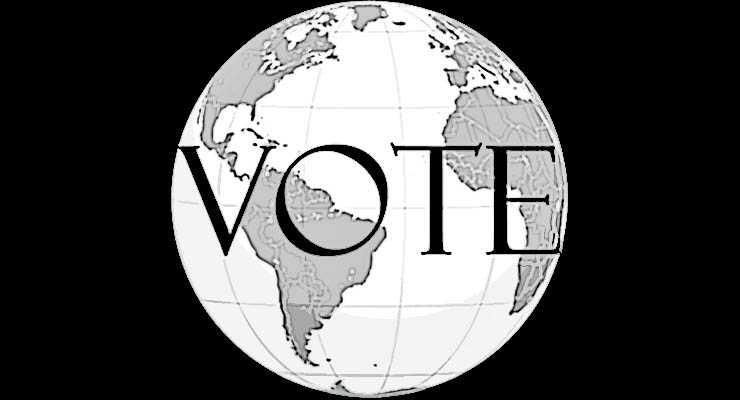
In the past several years, the world has been shaken by protests caused by the various countries’ ruling-elites and their selfishness. Of course, that isn’t anything new. Dictators don’t mind harming others in order to satisfy their personal interests and that’s nothing new.
Countries like Algeria, Egypt and Sudan and Zimbabwe are yet to successfully dismantle the apparatus left behind by their deposed dictators. Whilst others like Cameroon, Eretria, Rwanda and Uganda have to wait a little longer to even begin a life without a dictator.
Maybe, like me, you’re finding it hard to feel hopeful about the state of the world’s democracy with protests already spreading ahead of the G7 Summit in France. Protesters who are mostly grounded on climate change issues have doubled their anger due to the current ravaging Amazon wildfires. Climate change being an emotional issue, one spark of resistance can become a genuinely global movement.
Although global warming protesters are a small percentage of the world’s population, in recent years they have mounted significant and visible protests outside meetings of the new global order: the World Trade Organisation, the International Monetary Fund, the G7/G8 and G20. Back across the Atlantic, the UK’s Brexit plan continues the uncertainty as the October 31 deadline looms.
Despite all these challenges here’s something to lift your spirits. All of a sudden it seems that cities across the globe are standing up for liberty and rights
Besides the Amazon wildfires, the big story at the moment, of course, is Hong Kong’s protests against Chinese rule. There are, however, calls for protesters and government to exercise restraint to avoid a repeat of the Tiananmen Square massacre in the late 1980s. On the other side of Asia, meanwhile, the people of Istanbul, Turkey are coming to terms with the success of their own peaceful revolt against dictatorship. In June, a candidate devoted to the “language of love” was elected mayor, defeating a former prime minister from the party of President Recep Tayyip Erdoğan. Could it be that the political space in Turkey after 23 June has “burst wide open”? But since the paranoid Erdoğan has dismantled so much of the normal apparatus of governance, it could be either a still narrower dictatorship or a radical liberalization that occupies that space.
German Chancellor Angela Merkel warned in 2017 that Turkey’s approach to democracy and the rule of law are “deeply problematic” to the country’s future cooperation with the European Union. “These deep differences of opinion related to basic questions of democracy and the rule of law. They relate to freedom of expression in Turkey. They also relate to the many journalists that have been jailed for expressing their opinion,” Merkel said at the time in an address to the German parliament.
In Moscow, Russia voters will choose a new city council on 8 September – if the elections are not canceled. Police have arrested thousands and beaten dozens of protesters in the heart of the city. But, as both Alexander Zamyatin and Grigory Yudin explain, Vladimir Putin’s government is finding it hard to counter citizens’ demand to allow independent candidates to stand.
Mozambique is bullish ahead of October 15 general elections after a successful peace deal that seems to have ended over 30 years of bitter civil war and sporadic violence.
Meanwhile, Cameroon is bracing for another fight with authoritarianism in its October legislative elections. A small chance is there for the oppressed opposition who proclaims loudly that they too deserve a stake in the country and control the legislative agenda. However, the legal loophole used by President Biya’s government to legalize its crimes and shake-off international scrutiny through passing “legitimate” laws is still very effective. Fair elections give ordinary people a chance to participate in the decision-making processes that make a difference in their day-to-day lives.
Expect another contest with authoritarianism in October, when Budapest will hold elections for mayor and council. At present Viktor Orbán’s Fidesz party rules the Hungarian capital and on past form will stop at nothing to keep it that way. Lastly, Indonesia is faced with the ongoing protests in the West Papua region that first erupted several days ago after Papuan students in Surabaya, East Java, reportedly faced mistreatment by police and were subjected to racial abuse.
David Anderson says
Excellent summary of our times. Good you mentioned West Papua. Globally its a very small story and hardly noticed but it is emblematic of the heavy handed and racist policies of the Indonesian government. I see Indonesia as a probable flash point in the progress towards secularism worldwide in that it is going in reverse.
David Anderson says
Nice analysis. I am optimistic in that I think when people who don’t live in democratic countries see it elsewhere (via online, of course, its not just influencers people are watching, thank goodness)…. they’re reaction is usually: well why not that here? We’ve seen that a lot in Algeria and a bit in Cameroon, variously other places —- good ideas tend to TRAVEL.